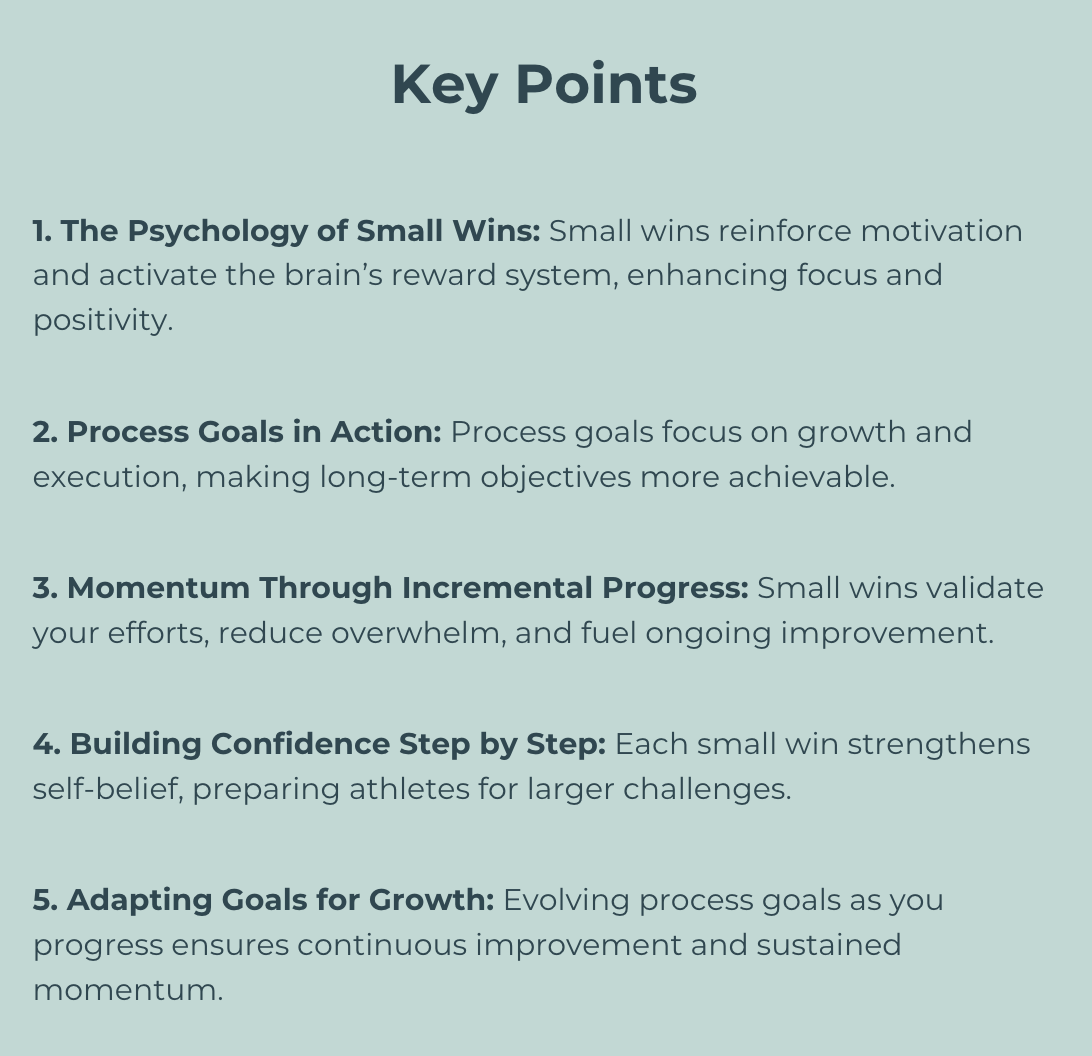The Power of Small Wins: Using Process Goals to Build Momentum and Self-Belief
What to Consider When Reading:
How can breaking down large goals into process-oriented steps make them feel more manageable and achievable?
What role does celebrating small wins play in maintaining motivation and confidence over time?
In sports, as in life, the big victories often steal the spotlight—winning a championship, setting a new personal record, or finally mastering a challenging skill. But behind every major success lies a series of small wins, often unnoticed, that pave the way to greatness. These small victories, achieved through focused process goals, hold immense power to build momentum and strengthen self-belief.
So, how do small wins and process goals work together to fuel success? More importantly, how can athletes use them as stepping stones to achieve larger goals and develop unwavering confidence? Let’s explore how this dynamic duo can transform your athletic journey.
The Psychology of Small Wins: Why They Matter
Small wins are exactly what they sound like—incremental achievements that signify progress. While they may seem minor, their impact on motivation and confidence is profound. Research in sports psychology shows that accomplishing small wins activates the brain’s reward system, releasing dopamine, which enhances focus, energy, and positivity.
Imagine you’re a basketball player working on your three-point shot. A small win might be hitting five consecutive shots during practice. While it doesn’t guarantee a game-winning performance, it validates your effort, builds trust in your abilities, and sets the stage for bigger accomplishments.
Process Goals: The Foundation of Small Wins
Process goals focus on the actions and behaviors within your control, rather than the outcome. Instead of fixating on winning a race (an outcome goal), a process goal could be maintaining proper form or pacing yourself effectively throughout. These goals shift your attention to growth and execution, reducing performance anxiety and fostering a mindset of continuous improvement.
When combined with small wins, process goals create a feedback loop: each small victory reinforces your confidence and motivates you to keep striving toward your ultimate objective.
Building Momentum
Reinforce Positive Habits
Small wins serve as markers that validate your training strategies and routines. For instance, if your goal is to improve endurance, hitting weekly mileage targets proves that your approach is working.Reduce Overwhelm
Big goals can feel intimidating, but breaking them into smaller, achievable steps makes them more manageable. Completing each step creates a sense of progress, easing the mental burden of long-term goals.Strengthen Self-Belief
Success breeds confidence. Small wins remind you of your capabilities, especially when faced with challenges. They prove that progress is possible, even if the ultimate goal feels far away.
Turning Process Goals into Small Wins
Here’s how to align process goals with small wins for maximum impact:
Be Specific and Measurable
Vague goals lead to vague outcomes. Define your process goals clearly. For example, instead of “improve swimming technique,” set a goal like “execute five perfect strokes per lap.”Celebrate the Journey
Acknowledging progress is essential. Whether it’s tracking your stats or giving yourself a mental high-five, every small win deserves recognition.Adjust as Needed
Process goals should evolve with your progress. If you’ve mastered a specific skill, challenge yourself to refine it further or tackle a new aspect of your performance.
Building Self-Belief
Self-belief doesn’t happen overnight—it’s cultivated through consistent effort and validation. Small wins provide evidence that you’re on the right track. With each step forward, your belief in your abilities grows stronger, preparing you to take on bigger challenges.
For example, a young gymnast learning a complex routine might start with mastering individual elements, celebrating each success along the way. These small wins build her confidence, helping her to eventually execute the full routine with self-assurance.
Final Thoughts
Big dreams and ambitious goals are exciting, but they can also feel overwhelming. By focusing on process goals and celebrating small wins, athletes can create a steady, sustainable path to success. These incremental achievements not only build momentum but also cultivate self-belief, proving that progress is always possible, no matter how small the steps.
Remember, it’s the small wins that make the big victories possible. Embrace the journey, one step at a time, and watch how your confidence and performance soar.

